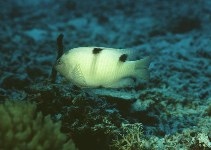| Family: |
Pomacentridae (Damselfishes), subfamily: Pomacentrinae |
| Max. size: |
18 cm TL (male/unsexed) |
| Environment: |
reef-associated; brackish; marine; depth range 1 - 10 m, non-migratory |
| Distribution: |
Indo-West Pacific: eastern Indian Ocean from the Andaman Sea, Rowley Shoals (Ref. 9710) and northwest Australia eastward to the Solomon Islands, north to China, south to the Great Barrier Reef. |
| Diagnosis: |
Dorsal spines (total): 13-13; Dorsal soft rays (total): 13-15; Anal spines: 2-2; Anal soft rays: 14-15. Description: Readily identified by the mostly white color and black blotches over the back (Ref. 48636) below the dorsal fin, and also on forehead. Juveniles vertical bars two black on forehead and on middle of body extending to dorsal fin. Body depth 2.1-2.3 in SL (Ref. 90102). |
| Biology: |
Adults occur in small patch reefs of shallow lagoons, with algae or seagrass habitats. The stomach of several specimens examined contained mainly algae and detritus mixed with sand grains (Ref. 7247). Oviparous, distinct pairing during breeding (Ref. 205). Eggs are demersal and adhere to the substrate (Ref. 205). Males guard and aerate the eggs (Ref. 205). Diurnal species (Ref. 113699). |
| IUCN Red List Status: |
Least Concern (LC); Date assessed: 23 September 2021 Ref. (130435)
|
| Threat to humans: |
harmless |
Source and more info: www.fishbase.org. For personal, classroom, and other internal use only. Not for publication.
